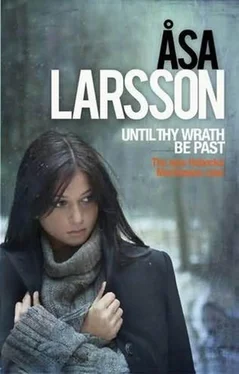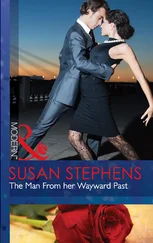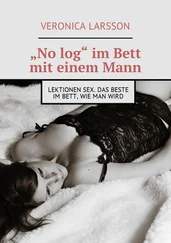Martinsson took off her coat and hung it up. Viinikainen withdrew to his desk.
Talk about looking for a needle in a haystack, she thought. I’ve no idea what I’m after. She wandered around, examining the shelves, glancing at the articles on phrenology from the ’30s and ’40s, payment records from Jukkasjärvi’s Poor Relief Board, handicraft diaries from the Kiruna School Archives.
Stop whingeing, she told herself. Roll up your sleeves.
Seventy minutes later she found Krekula’s Haulage Contractors in a register of hauliers in Kiruna municipality, listing how many and what kind of vehicles they had, persons authorized to sign on the firm’s behalf, addresses and so on.
She searched assiduously, untied bundles that hadn’t been opened for sixty years, opened archival boxes that had been closed for just as long, turned up her nose when little clouds of dust wafted up from the documents. In the end she had a splitting headache from all the dust and cellulose she’d been breathing in.
Viinikainen appeared and asked how she was getting on.
“Quite well,” she said. “I’ve found a few things, at least.”
Vera was waiting in the car. She stood up in her cage, wagging her tail affectionately when Martinsson got in.
“Thank you for being patient,” Martinsson said. “Let’s go for a spin.”
She drove up Mt Luossavaara and let Vera out. The dog sat down immediately.
“I’m sorry, old girl,” Martinsson said guiltily.
“Bad conscience, eh?” a voice said behind her.
It was Krister Eriksson. He was in his jogging clothes. An orange windcheater clashed with the pink parchment-like texture of his face.
When he smiled at Martinsson, she noticed his teeth. They were white and even. The only aspect of his face that was not damaged by fire.
“Well, well, who’s this then?” he said, looking at Vera. “Tintin’s going to be jealous.”
“It’s Hjörleifur Arnarson’s dog. I had to take her on, otherwise she’d have been given a one-way ticket to canine heaven.”
Eriksson nodded solemnly.
“And you’ve taken over the investigation, I gather. Wilma Persson will be pleased.”
“I don’t believe in all that stuff,” Martinsson said embarrassed.
He shook his head and winked.
“Have you been out jogging?” she said, changing the subject.
“Yep. I generally exercise my back by running up the hill to the old pithead. I’ve just finished.”
Martinsson looked up at the abandoned structure at the top of the mountain, grey and hollow-eyed.
If buildings can be ghosts, then that one certainly is, she thought. No doubt it says boo to whoever dares to walk past it at night.
“Pretty impressive, isn’t it?” Eriksson said, as if he had read her thoughts. “Would you like to take a closer look? I could do with a bit more exercise to ease my muscles. Hang on a minute. I’ll get my track suit from the car.”
He came back wearing a cheap mint-green track suit that looked at least twenty years old and a veteran of goodness knows how many sessions in the washing machine.
My God, Martinsson thought. But perhaps he feels he looks so hideous anyway that he couldn’t care less about the clothes he wears. It’s a pity, she thought as he walked up the mountain a few paces in front of her, teasing Vera.
He was thin and in pretty good shape: he would look good in practically any clothes he chose to wear. Though not a track suit that looked as if it had been discarded by an aerobics instructor circa 1989.
“What are you smiling at?” he said cheerfully.
“The view,” she lied impulsively. “I love this mountain. What a magnificent panorama!”
They stopped and looked down at Kiruna, spread out below them. The iron mine with its grey terraces forming the background to the town. The Ädnamvaara massif to the north-west, with its typical pyramid-shaped peaks. The wind generators on the site of the abandoned Viscaria copper mine. The church faced with spruce cladding painted Falun red, designed to evoke a Lappish hut. The town hall with its iconic black clock tower – an iron shell with protruding decorations. It always reminded Martinsson of mountain birches in winter, or a flock of reindeer horns. The horseshoe-shaped railway depot with its little red-painted workers’ cottages. The tower blocks in Gruvvägen and Högalidsgatan.
“Look at that! You can see the Kebnekaise massif today.”
He pointed to the light blue mountain range in the north-west.
“I can never work out which one is Keb,” he said. “I’m told it’s not the one that looks the highest.”
She pointed. He leaned towards her in order to see what she was pointing at.
“That’s Tuolpagorni,” she said. “The peak with the little crater. And the one next to it, to the right, is Kebne.”
He moved away from her.
“Please forgive me,” he said. “I’m leaning all over you, stinking of sweat.”
“No problem,” she said, and felt a wave of emotion surge through her body.
“The highest mountain in Sweden,” he said enthusiastically, screwing up his eyes and gazing at the massif.
“The most beautiful building in Sweden, dating from 2001,” Martinsson said, pointing at the church.
“The most beautiful building in Sweden, dating from 1964,” Eriksson said, pointing at the town hall.
“The most beautiful town in Sweden,” she said with a laugh. “The municipal architect really tried his best to make the town a work of art. In those days they still designed towns so that a network of streets all led to the square and the town hall. But the streets of Kiruna were allowed to wander along the hillside as they pleased.”
“I can’t get my head round the fact that they’re talking about moving the whole town.”
“Nor can I. Haukivaara was such a perfect mountainside to build a town on.”
“But if the seam of iron ore turns out to run under the town…”
“… then the town has to move.”
“That’s what the authorities say,” Eriksson said. “I don’t come from Kiruna myself. But I have the impression that the locals aren’t too worried. When I ask them what they think about the town having to move, they just shrug their shoulders. My next-door neighbour is eighty, and she thinks that of course the town ought to move to the west because that way she’d be closer to the shops. I think it’s all very odd. The only person who seems to have a view is someone who’ll be dead and buried when the move actually takes place.”
“I think people are concerned,” Martinsson said hesitatingly. “But the people of Kiruna have always been aware that the only reason we’re here is that this is where the iron ore is. And if the mine isn’t profitable any more, then we’ve no income to live off. So if the company needs to move the mine, well, there’s nothing to argue about. So we accept the inevitable. But if we accept it, don’t be misled into thinking that we don’t care.”
“But one thing doesn’t exclude the other.”
“No, I know. But I think we need time before we understand what it’s really all about. Before we realize that although we have no choice, we can still regret that our town will never be the same again.”
“There ought to be farewell concerts in the buildings that will be demolished,” Eriksson said. “Weeping ceremonies. Music. Lectures. Story-telling.”
“I’ll be there,” Martinsson said with a smile.
She remembered what it had been like when she’d walked up Mt Luossavaara with Måns Wenngren. He had felt cold and uncomfortable. She would have liked to point out the sites to him and talk about them. As she was doing now.
Martinsson was sitting on the kitchen sofa in Sivving Fjällborg’s boiler room. She was wearing thick woollen socks and a knitted jumper that had once belonged to her father.
Читать дальше












